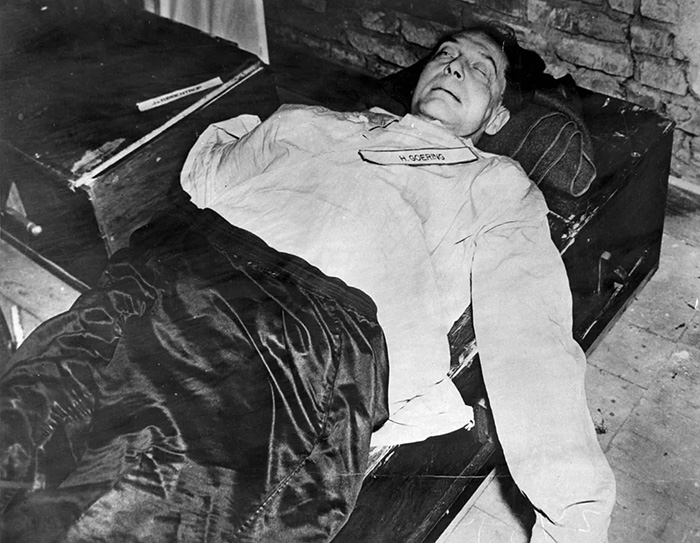
The body of Hermann Göring, Oct. 16, 1946
Hermann Göring was a prominent figure in the Nazi Party, second only to Adolf Hitler in the hierarchy of the Third Reich. His influence extended across various sectors of the Nazi regime, where he held numerous titles and wielded significant power. As one of the earliest members of the Nazi Party, Göring was instrumental in the establishment and consolidation of the totalitarian state. He founded the Gestapo, the official secret police of Nazi Germany, and was appointed as Commander-in-Chief of the Luftwaffe, the German Air Force, playing a pivotal role in the military campaigns of World War II.
Göring’s influence was not limited to military affairs; he was also involved in economic planning, which included the Aryanization of Jewish property and the exploitation of conquered territories. His involvement in the Holocaust was significant, as he was the one who ordered Reinhard Heydrich to prepare the “Final Solution,” the plan to systematically exterminate the Jewish population of Europe.
After the war, Göring was captured by the Allies and stood trial at the Nuremberg Trials, the series of military tribunals held to bring Nazi war criminals to justice. He was charged with war crimes, crimes against peace, and crimes against humanity. Throughout the trial, Göring remained defiant, attempting to justify the actions of the Nazi regime and his role within it. He was found guilty on all counts and sentenced to death by hanging.
However, Göring never faced the gallows. The night before his scheduled execution, he committed suicide using a cyanide capsule that he had managed to conceal from his captors. His death on October 15, 1946, was a final act of defiance and a way to avoid the shame of public execution. Göring’s suicide was a subject of much controversy and speculation, as it raised questions about how he had obtained the poison and whether there had been any negligence on the part of the prison guards.
The enigmatic circumstances surrounding Hermann Göring’s suicide at the Nuremberg trials have long perplexed historians and the public alike. A recent revelation by a former American prison guard, Herbert Lee Stivers, has shed new light on this historical puzzle. Stivers, at the age of 78, confessed to the Los Angeles Times that he unwittingly became an accomplice in Göring’s suicide by smuggling a cyanide capsule to him, believing it to be medicine for the ailing Nazi leader.
According to Stivers, he was seduced into the act by a German girl named Mona, who deceived him into delivering a vial of liquid cyanide hidden inside a fountain pen to Göring’s cell. This account provides a plausible explanation for how Göring, who was under constant surveillance, could have obtained the means to end his life, thus avoiding the ignominy of execution by hanging as sentenced by the Nuremberg tribunal.
Göring’s suicide on October 15, 1946, the night before his execution, was marked by a note he left, declaring his refusal to be hanged and his decision to die in the manner of the Carthaginian general Hannibal.

Theodore Lee is the editor of Caveman Circus. He strives for self-improvement in all areas of his life, except his candy consumption, where he remains a champion gummy worm enthusiast. When not writing about mindfulness or living in integrity, you can find him hiding giant bags of sour patch kids under the bed.
